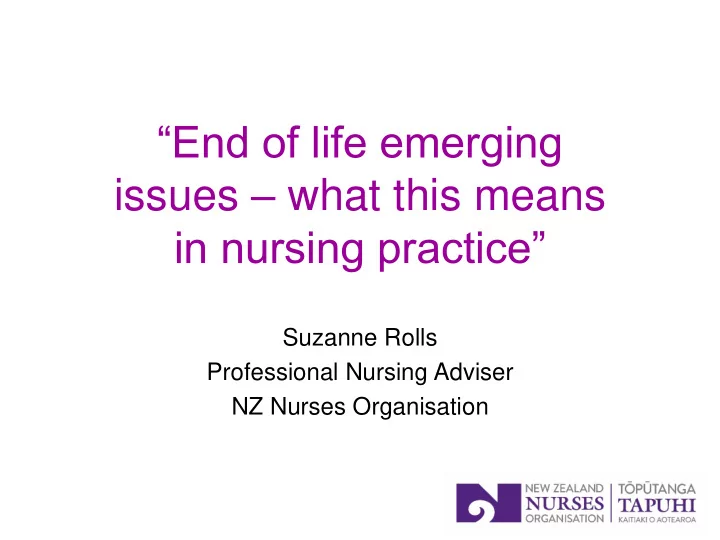

“End of life emerging issues – what this means in nursing practice” Suzanne Rolls Professional Nursing Adviser NZ Nurses Organisation
Community action changing healthcare delivery – informed consent – creation of the H&DC
Aiding suicide
Assisted dying debate • Pro • Against • Want laws to • Want no law enable HP to be change to enable able to assist HP to be able to dying assist dying
NZNO position paper • Complex issues • Most response • NZNO wants any from members on any consultation law to protect • Many members nurses. agreed • Many members disagreed
Care of the tūpāpaku Rūnanga kaiwhakahaere Kerri Nuku said that there was inconsistency in cultural competency in the health sector, and it was impacting Māori staff too. "While nursing and doctors have a duty of care, manaakitanga, not always are we allowed to execute that because of the system and the structure that we work under," she said. http://www.radionz.co.nz/news/te-manu-korihi/328536/whanau-say-their-cultural-needs-are-not-met-when- Māori -die
Public campaign - Legalising medicinal cannabis
NZNO position paper medical marijuana
Rules
Only exception in NCNZ code of conduct – but does not cover assisted dying • 1.9 You have the right not to be involved in care (reproductive health services) to which you object on grounds of conscience under section 174 of the Act. You must inform the health consumer that they can obtain the service from another health practitioner.
What are the risks?
Could we do better? • Increasing education and awareness of the public • Breakdown policy and funding barriers • Increase the use of Enrolled Nurses • Available education for nurses that is fully funded and accessible
MOH - Palliative care ‘Palliative care’ is care for a person of any age who has a life-limiting illness. Palliative care involves supporting and helping the person to live as comfortably and fully as possible.
A ‘life - limiting illness’ is one that cannot be cured and may at some time result in the person dying (whether that is years, months, weeks or days away). Palliative care involves providing assistance at all stages of the life-limiting illness. Palliative care is provided in the community, in hospices and in hospitals.
It can be provided by all health care professionals, including GPs and district nurses – supported where necessary by specialist palliative care services. Hospices are the main providers of specialist palliative care services for people living in the community.
Palliative care review • Palliative care • Te Ara Whakapiri review • Tool kit commenced in 2015 and released March 2017. • Action plan released by MOH March 2017
NZNO endorsement
Enablers • Nursing knowledge • Scopes of practice – NP/RN/EN • Core aspects of the essence of nursing practice • Partnership approaches
End of life issues to consider • Standards • Expectations • Complexity • Emotion • Policy • Funding • Health literacy • Family whānau abilities and participation
Context and community
Recommend
More recommend